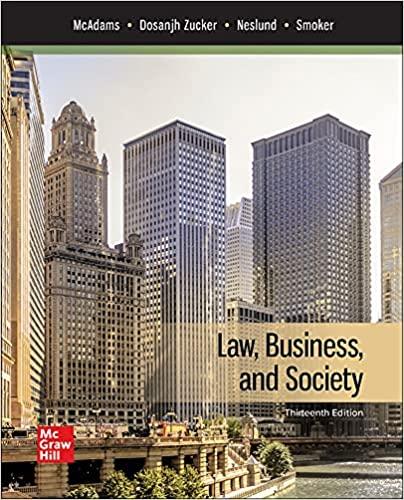The State of Tennessee imposes demanding durational-residency requirements on all individuals and businesses seeking to obtain or
Question:
The State of Tennessee imposes demanding durational-residency requirements on all individuals and businesses seeking to obtain or renew a license to operate a liquor store. One provision precludes the renewal of a license unless the applicant has resided in the State for 10 consecutive years. Another provides that a corporation cannot obtain a license unless all of its stockholders are residents. The Court of Appeals for the Sixth Circuit struck down these provisions as blatant violations of the Commerce Clause, and neither petitioner an association of Tennessee liquor retailers nor the State itself defends them in this Court. The Sixth Circuit also invalidated a provision requiring applicants for an initial license to have resided in the State for the prior two years, and petitioner does challenge that decision. But while this requirement is less extreme than the others that the Sixth Circuit found to be unconstitutional, we now hold that it also violates the Commerce Clause and is not shielded by § 2 of the Twenty-first Amendment. Section 2 was adopted as part of the scheme that ended prohibition on the national level. It gives each State leeway in choosing the alcohol-related public health and safety measures that its citizens find desirable. But § 2 is not a license to impose all manner of protectionist restrictions on commerce in alcoholic beverages. Because Tennessee’s 2-year residency requirement for retail license applicants blatantly favors the State’s residents and has little relationship to public health and safety, it is unconstitutional.
Questions
1. What was the Association’s reason for challenging the TABC’s recommended approval of retail liquor licenses for Total Wine and Affluere? In considering your answer, you might wish to review the section “Theory and Practice” in Part One of this chapter.
2. In general, what does the dormant Commerce Clause prohibit? Which of its two principles is relevant in this case?
3. Why did the two-year durational-residency requirement violate the dormant Commerce Clause?
4. Both Michigan and New York permitted in-state wineries to obtain licenses that allowed them to ship directly to consumers while not permitting out-of-state wineries to do the same. At the time, 26 states allowed some form of direct shipping. Thirteen had reciprocity agreements such that shipments from out of state were allowed if the state of origin of the wine afforded similar nondiscriminatory treatment to its wineries. Two small wineries brought separate suits to challenge the direct ship rules of, in one case, Michigan and, in the other case, New York. How would you rule? Explain. See Granholm v. Heald, 544 U.S. 460 (2005).
5. It is not uncommon for states, seeking to entice major new business investment, to provide tax incentive packages to companies to lure them away from other states. If the deal offered by the state requires the business “to make every effort to ensure that a substantial number of employees are residents” of the state, would that provision be vulnerable to a dormant Commerce Clause challenge? Explain. See Kopecky v. Iowa Racing and Gaming Commission, 891 N.W.2d 439 (Iowa 2017).
a. What if plaintiffs, residents of an adjacent state who had applied and been turned down for jobs when the facility opened, could show that the rejection rate of qualified out-of-state applicants was 90 percent, while the rejection rate of similarly qualified in-state applicants was 60 percent?
b. What if, alternatively, the language of the deal provided that the business “will prioritize hiring of applicants who are residents” of the state? See, Julia Jacobs, “In wake of Foxconn deal, Wisconsin and Illinois vie for jobs,” Reuters, August 24, 2017 [www.reuters.com].
6. A number of states require new cars be sold only through licensed franchises independent of the car manufacturers. Tesla’s business model is to sell direct to its customers. Does Tesla have a dormant Commerce Clause case in those states? Explain. For examples of Tesla’s legal fights for the right to sell direct, see, Nick Sibilla, “Connecticut Should Be Tesla Country,” The New York Times, July 7, 2017 [www.nytimes.com]; Bob Sorokanich, “FTC to states: Quit banning direct-toconsumer car sales,” Road and Track, May 12, 2015 [www. roadandtrack.com]; and Callum Borchers, “SJC rules for Tesla in fight with car dealers,” Boston Globe, September 15, 2014 [www.bostonglobe.com].
7. North Dakota rules required those bringing liquor into the state to file a monthly report, and out-of-state distillers selling to federal enclaves (military bases, in this instance) were required to label each item indicating that it was for consumption only within the enclave. The United States challenged those rules after sellers said they would discontinue dealing with the military bases or they would raise their prices to meet the cost of dealing with the two rules. See North Dakota v. United States, 495 U.S. 423 (1990).
a. What were the constitutional foundations of the federal government’s challenge?
b. What were the state’s reasons for adopting the rules?
c. How did the court hold?
Step by Step Answer:

Law Business And Society
ISBN: 9781260247794
13th Edition
Authors: Tony McAdams, Kiren Dosanjh Zucker, Kristofer Neslund, Kari Smoker





